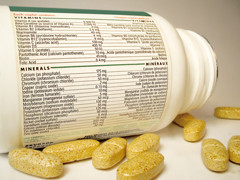Daily multivitamin-multimineral may help protect against cancer

Americans’ love affair with vitamins—more than half of us take one a day—isn’t well supported by science. Trials of single vitamins, like E, C, and beta carotene, have been a bust. Whether multivitamins offer any health benefits has been something of a mystery.
Both a state of the science conference sponsored by the National Institutes of Health in 2006 and the 2010 Dietary Guidelines for Americans concluded that there wasn’t enough evidence to recommend for or against the use of any vitamins, including multivitamins, to prevent heart disease, cancer, and other chronic conditions.
That may be changing for multivitamins. A new report indicates that taking a standard multivitamin-multimineral pill every day for more than a decade reduces the odds of developing cancer.
The finding comes from the Physicians’ Health Study II, a Harvard-based trial begun in 1997. Nearly 15,000 male physicians aged 50 years and older took a daily pill containing 31 vitamins and minerals (Centrum Silver) or a placebo. No one, including the investigators, knew who was taking what until the trial ended.
Over the course of the trial, 1,379 men in the placebo group developed some form of cancer (18.3 cancers per 1,000 men per year), compared to 1,290 men in the multivitamin group (17.0 cancers per 1,000 men per year). That represents an 8% reduction in cancer. Rates of prostate cancer were the same in both the multivitamin and placebo groups. Deaths were also similar in both groups. The findings were presented today at the annual American Association for Cancer Research Frontiers in Cancer Prevention Research meeting in Anaheim CA and published online by the Journal of the American Medical Association.
“This modest reduction could be the result of addressing micronutrient deficiencies,” said Howard D. Sesso, co-principal investigator of the study and an associate professor of medicine at Harvard Medical School. “It is also possible that low doses of several vitamins and minerals might work together in other ways to prevent cancer.”
The effect of multivitamin-multimineral use on heart disease will be published in early November, with papers on eye disease (cataract and macular degeneration) and cognitive function to follow.
One a day for you?
A handful of observational studies have looked at possible connections between multivitamin use and cancer. (Observational studies follow large groups of people living their lives as they choose, and look for links between diet, exercise, or other factors and health.) Some indicated less cancer with multivitamin use, others showed little or no effect. The results from the Physicians’ Health Study II nudge the evidence in the benefit direction for a standard multivitamin-multimineral.
They don’t provide a slam dunk, though. For one thing, almost all of the participants were white men with excellent access to health care. They were also fairly healthy—under 4% were smokers, and many followed healthy diets. It’s possible that vitamins and minerals could have a smaller—or larger—anticancer effect in women, other ethnic or racial groups, and people who aren’t as healthy.
“Although our results indicate that taking a daily multivitamin may be one strategy for helping prevent cancer, they must be viewed in light of other evidence, past and future,” said lead author Dr. J. Michael Gaziano, a cardiologist at Harvard-affiliated Brigham and Women’s Hospital and VA Boston Healthcare.
Should you take a multivitamin-multimineral supplement? It can certainly provide some nutritional insurance, explained Dr. Eric Rimm, associate professor of nutrition and epidemiology at the Harvard School of Public Health. But it can’t substitute for vegetables, fruits, whole grains, and other healthful foods. “Foods have flavonoids, carotenoids, and many other substances that likely work to prevent cancer that multivitamins just don’t contain,” he said.
About the Author

Patrick J. Skerrett, Former Executive Editor, Harvard Health Publishing
Disclaimer:
As a service to our readers, Harvard Health Publishing provides access to our library of archived content. Please note the date of last review or update on all articles.
No content on this site, regardless of date, should ever be used as a substitute for direct medical advice from your doctor or other qualified clinician.












